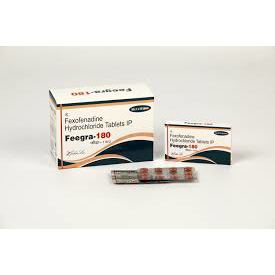FEGRA 180mg Tablet
$13.00 $10.00
FEEGRA 180mg Tablet 10s

Description
Fegra 180 Tablet is an anti-allergy medicine used in the treatment of allergic symptoms such as runny nose, congestion or stuffiness, sneezing, itching, swelling, and watery eyes. It also helps treat skin allergies with itching, redness, or swelling.
fegra 180mg tablet may be taken with or without food, in the dose and duration as advised by the doctor. The dose you are given will depend on your condition and how you respond to the medicine. You should keep taking this medicine for as long as your doctor recommends. Do not stop taking it without consulting your doctor.
The most common side effects are headache, drowsiness, dizziness, and nausea. Most of these are temporary and usually resolve with time. Please consult your doctor if any of these side effects do not resolve or persist for a longer duration.
Do not self-medicate or recommend your medicine to another person even if you see the similarity in symptoms. Consult your doctor to get the most benefit. Inform your doctor if you are suffering from any problems related to the kidneys, liver, or heart. Pregnant and breastfeeding mothers should not take this medicine without consulting a doctor.
Read More:

USES OF FEGRA
- Relieves symptoms associated with year-round and seasonal allergies, including sneezing, runny nose, itchy, watery, red eyes and itchy nose/palate/throat
HOW FEGRA WORKS
FEGRA blocks a natural substance, histamine that your body makes during an allergic reaction. Fexofenadine is a selectively peripheral H1-blocker. Blockage prevents the activation of the H1 receptors by histamine, preventing the symptoms associated with allergies from occurring.
DIRECTIONS FOR USE
Always take this medicine exactly as your doctor has directed by you. Check with your doctor or if you are not sure. Do not use for a long period of time unless instructed by a doctor. Take your medicine with water before a meal. This medicine starts to relieve your symptoms within 1 hour and lasts for 24 hours.

SIDE EFFECTS OF FEGRA
SERIOUS
- Swelling of the face, lips, tongue or throat, flushing, chest tightness and difficulty breathing
COMMON
- Headache
- Drowsiness
- Feeling sick (nausea)
- Dizziness
RARE
- Tiredness
- Sleepiness
HOW TO MANAGE SIDE EFFECTS
Feeling sick (nausea) or indigestion:
Stick to simple meals and do not eat rich or spicy foods.
Headache:
Rest and drink plenty of fluids. Ask your doctor to recommend a painkiller.
Drowsiness or dizziness:
Get up and move around to feel awake, take small naps to edge off the sleepiness. Give your eyes a break to avoid fatigue and eat a healthy food to boost energy.
SAFETY ADVICE

Alcohol

Pregnancy

Breast feeding
Because of low milk levels and lack of sleepiness, use of fegra 180mg tablet would not be expected to cause any adverse effects in breastfed babies.

Driving
However, you should make check that fegra 180mg tablet does not make you feel sleepy or dizzy before driving or operating machinery.

Kidney

Liver
However, consult your doctor before giving Fexofenadine to your child in case of severe liver disease.
WHAT IF YOU FORGET TO TAKE FEGRA TABLET?
INTERACTIONS
Tell your doctor if you are taking or have recently taken any other medicines, including medicines obtained without a prescription or the following:
- Antacids (contains aluminum or magnesium hydroxide)
SYNOPSIS
| Drug | : | Fexofenadine |
| Pharmacological Category | : | Histamine H1 Antagonist, Second Generation |
| Therapeutic Indication | : | Upper Respiratory allergies |
| Dosage Forms | : | Tablet, Oral suspension |
MORE INFORMATION
Store below 20-25°C and keep out of reach of children.
FAQs ABOUT FEGRA
What is the use of FEGRA?
It is used in adults and adolescents of 12 years and older to relieve the symptoms that occur with long term allergic skin reactions (chronic idiopathic urticaria) such as itching, swelling and rashes.
What is the best time of day to take FEGRA?
Once-daily antihistamines reach their peak efficacy 8 to 12 hours after you take them, so using them at dinnertime or before bed means better control of your daytime symptoms. Consult your doctor for advice.
Is it okay to take antihistamine everyday?
Based on your symptoms, you can take antihistamines: Every day, to help keep daily symptoms under control. Use when you have symptoms. Consult your doctor for advice.
Be the first to review “FEGRA 180mg Tablet” Cancel reply
Related products
Allergies
Allergies
Allergies
Allergies
Allergies
Allergies
Allergies
Allergies












Reviews
There are no reviews yet.